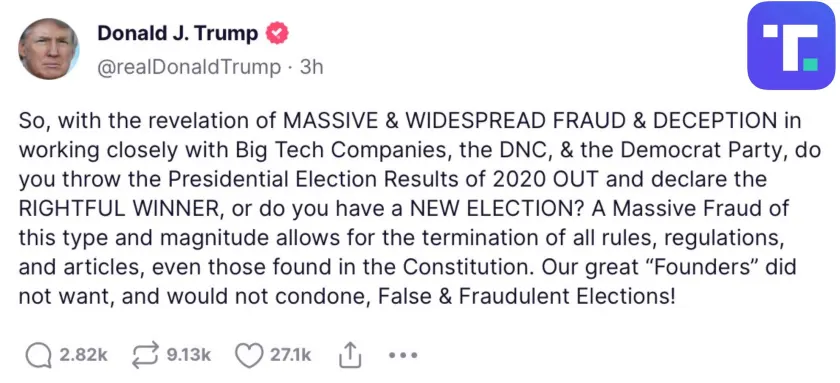“No honest person can now deny that [Donald] Trump is an enemy of the Constitution,” Liz Cheney said after the former president appeared to call for terminating the United States Constitution in a post on his alternative social media site, Truth Social, on Saturday, Dec. 3.

The Truth Social post heard across the Republican party as former president Donald Trump appeared to call for the termination of the U.S. Constitution. (Truth Social)
Here’s what Trump posted: “Do you throw the Presidential Election Results of 2020 OUT and declare the RIGHTFUL WINNER, or do you have a NEW ELECTION? A Massive Fraud of this type and magnitude allows for the termination of all rules, regulations, and articles, even those found in the Constitution.”
You read that correctly—All rules, regulations and articles, even those found in the Constitution.
In some respects, that is the most radical pronouncement the former president has ever made. A system like ours, a republic, depends on all the participants agreeing to play by some very basic rules of engagement, the chief of which is that we settle our disputes at the ballot box. The winner tries to use their power for the betterment of the United States and the loser withdraws to regroup and perhaps contest for power at the next election. White House spokesman Andrew Bates provided a perfect response: “You cannot only love America when you win.” Bates called Trump’s statement “anathema to the soul of our nation, and should be universally condemned.”
A Step Too Far?
Former Vice President Mike Pence reacted to Trump’s wild statement firmly. “I must tell you that I think that everyone that serves in public office, everyone that aspires to serve or serve again, should make it clear that we will support and defend the Constitution of the United States,” Pence said on a Monday morning radio talk show.
Condemnation of the former president’s social media post has been nearly universal, including in the Republican Party, but his statement has not generated much of the usual outrage upon which he seems to thrive. There are probably two reasons for this. First, what he posted is so detached from reality—how do you terminate a constitution?—that it is hard for anybody to take it very seriously. Gabriel Sterling of the Georgia Secretary of State Office, said, “It’s ridiculous, it’s insane, to suspend the Constitution. Come on man, seriously?”
Second, if the 2022 midterm election results are any indication, most of the American people are ready to move on, to stop obsessing over the results of the 2020 presidential election. Even those who feel that something was not quite right about the 2020 election seem to have concluded that there is nothing now to be gained by dwelling on the past. Some central core of Trump supporters will go to their graves insisting that the 2020 election was stolen, but the majority of the nation’s political attention will soon turn to the 2024 presidential election, where Mr. Trump’s fixation on past grievances may actually hurt his chances of winning the nomination or the presidency.
Writing for Reuters, veteran political observer James Oliphant said, “Donald Trump by all accounts is still the same Donald Trump—aggrieved, petulant and tunnel-focused on his political standing. It’s the electoral landscape around him that has changed. And after Republicans’ underwhelming performance in the 2022 midterm elections, people in the party increasingly want to look forward, not back.”
Rattling the Norms
In the course of his remarkable political career over the last seven years, Donald Trump has deliberately rattled a large number of American norms—refusing to concede, not attending his successor’s inauguration, name-calling from the presidential podium, denouncing war heroes, and the like—but this time he appears to have crossed what is almost a sacred line in American democracy. His post made it clear that, at least at that moment, he was willing to pull down the constitutional temple if necessary to return to power.
Trump attempted to walk back his remarks two days later. On Truth Social, he wrote, “The Fake News is actually trying to convince the American People that I said I wanted to “terminate” the Constitution. This is simply more DISINFORMATION & LIES, just like RUSSIA, RUSSIA, RUSSIA, and all of their other HOAXES & SCAMS.” Perhaps this is an instance of the adage that our mistake is taking Trump literally but not seriously, when in fact we should take him seriously but not literally. In some sense, of course, he was just letting off steam. Nevertheless, his remarks got the attention of the “moderates” in the Republican Party.
“Well, I think you take an oath to the Constitution, you don’t take it provisionally,” Sen. Roy Blunt of Missouri said. “I can’t imagine that a former president would make that statement.” Sen. Lisa Murkowski of Alaska tweeted Monday that Trump’s remark, “Suggesting the termination of the Constitution is not only a betrayal of our Oath of Office, it’s an affront to our Republic.” Sen. Mitt Romney of Utah said, “When President Trump says he wants to suspend the Constitution, he goes from being MAGA to being RINO [Republican In Name Only].” Sen. John Cornyn of Texas said, “I don’t know why anybody would say something like that, certainly not an ex-president. I think that’s irresponsible.” Sen. Ted Cruz of Texas settled for calling the Constitution “enduring, and it will be for millennia to come.” Sen. Mike Rounds of South Dakota said, “Anyone who desires to lead our country must commit to protecting the Constitution. They should not threaten to terminate it.”
As elected officials, we take an oath to support and defend the Constitution. We should never dishonor that oath. No one is above the Constitution.
Anyone who desires to lead our country must commit to protecting the Constitution. They should not threaten to terminate it.
— Senator Mike Rounds (@SenatorRounds) December 5, 2022
For the Good of the Country
There are previous episodes in American history where the loser thought he had won and then had to decide what to do about it. In the case of George W. Bush versus Al Gore in 2000, Gore conceded after the Supreme Court voted 5-4 that the recount in Florida must stop, and that Bush was the 43rd president of the United States. On Dec. 13, 2000, Gore said on national television, “Now the U.S. Supreme Court has spoken. Let there be no doubt, while I strongly disagree with the court’s decision, I accept it. I accept the finality of this outcome . . . and tonight, for the sake of our unity as a people and the strength of our democracy, I offer my concession.” Gore did not insist that the Constitution be terminated.

Richard Nixon’s upbringing was marked by evangelical Quaker observances, such as refraining from drinking alcohol, dancing and swearing. | Charles Tasnadi/AP Photo
When Richard Nixon lost the 1960 election to John F. Kennedy, he was pretty sure the results in Illinois and probably Texas, too, had been manipulated to secure Kennedy’s victory. For the good of the country, Nixon nevertheless conceded in the early morning hours of Nov. 9. “I want to say that one of the great features of America is that we have political contests. That they are very hard fought, as this one was hard fought, and once the decision is made, we unite behind the man who is elected. I want Sen. Kennedy to know, and I want all of you to know that certainly if this trend does continue, and he does become our next president, he will have my wholehearted support and yours as well.” Nixon did not demand that the Constitution be torn up.
The Path Taken By Andrew Jackson
An even better example is found in the 1824 election, which featured four presidential candidates: Andrew Jackson of Tennessee, John Quincy Adams of Massachusetts, William Crawford of Georgia, and Henry Clay of Kentucky. After no candidate received a majority of the Electoral College vote, John Quincy Adams was elected president by the House of Representatives by a single vote on Feb. 9, 1825. This was the second (and so far, last) time the presidential election was decided in the House of Representatives. Previously, in the spring of 1801, it took 36 ballots in the House to elect Jefferson president after he and his running mate Aaron Burr tied in the Electoral College at 73 votes each.

Portrait of President Andrew Jackson, 1845 by Thomas Sully (artist) American. (National Gallery of Art/ nga.gov)
Andrew Jackson had every reason to be upset. Although no candidate had received a majority in the popular vote or in the Electoral College, Jackson had polled better than his three rivals in each category. When the House elected John Quincy Adams instead, the Jacksonians accused Adams and Kentucky Rep. Henry Clay, who came in fourth, of entering into a “corrupt bargain,” in which Adams got the presidency and Clay became secretary of state. Although Jackson, who was a serial duelist and a man of fiery temper, was outraged by the election results, he did not march on the Capitol or call for the termination of the U.S. Constitution. Instead, he immediately made it clear that he would run again in the 1828 election and—four years later—he trounced John Quincy Adams in the rematch.
How Do You Terminate a Constitution?
Trump’s call for voiding the Constitution raises more questions than it answers. How would it be done? How does a sovereign nation void its existing constitution? One way would be to call for a new constitutional convention. Article V of the 1787 Constitution says that two-thirds of the states can call for a constitutional convention, and the constitution they produce becomes the fundamental law of the United States when three-quarters of the states ratify it. That has never happened in 234 years and, short of a national cataclysm of some sort, is unlikely ever to happen. The bar is just too high.
The only other way to void the Constitution would be actual revolution. The Jan. 6, 2021, riot at the U.S. Capitol was a terrifying spasm of the anger and bewilderment that ardent Trump supporters felt when the president and his closest aids assured them that the 2020 election had been stolen, but on the scale of the French, Russian, Chinese or even American revolutions, it was a minor event. It did not trigger a violent uprising across the country. We may indeed be in a “cold civil war,” but it is unlikely to break out into a nationwide insurrection.
What Mr. Trump seems not to understand is that the American people are surprisingly conservative with respect to the U.S. Constitution. They venerate it. All the polls and studies show that while it sometimes frustrates them, the people are reluctant even to amend the Constitution, much less call for a new constitutional convention, a coup d’état, or its termination.
Republished with permission from Governing Magazine, by Clay S. Jenkinson

Governing
Governing: The Future of States and Localities takes on the question of what state and local government looks like in a world of rapidly advancing technology. Governing is a resource for elected and appointed officials and other public leaders who are looking for smart insights and a forum to better understand and manage through this era of change.
